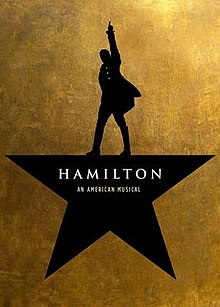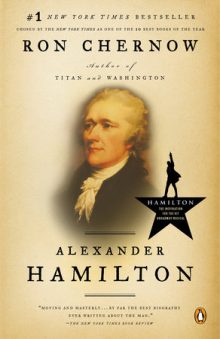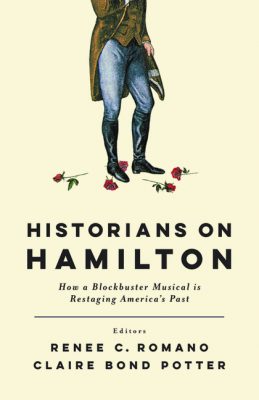
This the promotional poster for the musical (courtesy of Wikipedia).
Our whole family went—meaning also my spouse, son (age 10), and daughter (age 6). We had been listening to the soundtrack, together, for well over a year. My spouse started listening earlier than that. But it was just last summer, during a family vacation which involved a lot of driving, that I finally listened, closely, to the lyrics. There’s nothing like long stretches of boring highway and confinement to a car to focus one’s attention. From then on I was hooked. My spouse suggested, after the trip, that we might make a trip to the musical as a family Christmas present to ourselves. The tickets were quite expensive ($180 each, before fees and taxes), but we felt it was worth the sacrifice.
If you’ve listened to the soundtrack or seen the musical, you might question why we allowed our kids to go. We thought about that too, and had a few reservations–especially for our six-year-old. If it were a movie, I think the show would garner a PG-13 rating. We decided to bring her because she loves the music. She also would’ve been crushed if her brother went and she didn’t. Also, she’s attracted to dance and shows. We knew the spectacle would amaze her. And we weren’t wrong. She was literally on the edge of her seat for the entire two hours. She’s an intense young person (described by one of her teachers as someone with a volcano’s worth of energy), but the show captured all her focus. I’m so glad we brought her.
What motivated me, as a historian, to see the show? First, despite having taught pre-Civil War American history (the survey), and in spite of having read several books about the American Revolution and the Early Republic, nothing about Hamilton had ever really hooked me.  Yes, I was aware of his contribution to the Federalist Papers. Yes, I knew he had promoted a National Bank–and a system of internal improvements. And of course, like every one of my survey students, I knew that he had died in a duel with Aaron Burr. But nothing had motivated me to want to learn more about his biography and deeper significance. Nothing, that is, until I listened to the musical lyrics—over and over, courtesy of my kids—on road to Connecticut last summer. Indeed, if it weren’t for my daughter’s (and son’s, to a lesser extent) incessant requests on our Great American Road Trip, I probably wouldn’t have wanted to see Hamilton.
Yes, I was aware of his contribution to the Federalist Papers. Yes, I knew he had promoted a National Bank–and a system of internal improvements. And of course, like every one of my survey students, I knew that he had died in a duel with Aaron Burr. But nothing had motivated me to want to learn more about his biography and deeper significance. Nothing, that is, until I listened to the musical lyrics—over and over, courtesy of my kids—on road to Connecticut last summer. Indeed, if it weren’t for my daughter’s (and son’s, to a lesser extent) incessant requests on our Great American Road Trip, I probably wouldn’t have wanted to see Hamilton.
And that music. It’s so creative, contemporary, and fantastic. Lin Manuel-Miranda’s artistic rendition of Ron Chernow’s biography, Alexander Hamilton, inspired me–a historian by training and, more importantly, by intellectual habit—to want to learn more about a historical character I should’ve wanted know on his merits. Lin Manuel-Miranda’s bit of public history inspired me to pick up Chernow’s doorstop of a biography. A show made for Broadway inspired me to do my duty by way of our “ten-dollar Founding Father.” (Side note: I still think Harriet Tubman should at least share credits on that iteration of our legal tender—half should be printed with Hamilton, and the other half with Tubman.)
 I’m only on page 150 or so of Chernow’s doorstop. I like big books, however, so I predict I’ll finish it. I might even read Renee C. Romano’s and Claire B. Potter’s volume, Historians on Hamilton: How a Blockbuster Musical is Restaging America’s Past (Rutgers University Press, out May 9, 2018). I’m now curious to know how Lin Manuel-Miranda’s production has shaped the interests and thinking of other professional historians. I want to know how the show has changed how they see Alexander Hamilton. Am I the only historian thinking differently about his person, his cast of associates, his relationship with Washington, and the effects of his actions and ideas?
I’m only on page 150 or so of Chernow’s doorstop. I like big books, however, so I predict I’ll finish it. I might even read Renee C. Romano’s and Claire B. Potter’s volume, Historians on Hamilton: How a Blockbuster Musical is Restaging America’s Past (Rutgers University Press, out May 9, 2018). I’m now curious to know how Lin Manuel-Miranda’s production has shaped the interests and thinking of other professional historians. I want to know how the show has changed how they see Alexander Hamilton. Am I the only historian thinking differently about his person, his cast of associates, his relationship with Washington, and the effects of his actions and ideas?
Perhaps I’m the last historian in America to have seen the show. But if not, and if by chance you haven’t seen it, start saving your nickels and dimes. When it appears at a theater near you, just do it. Afterwards you might find yourself trolling used bookstores for your own Chernow doorstop. And maybe you’ll even read it. – TL

2 Thoughts on this Post
S-USIH Comment Policy
We ask that those who participate in the discussions generated in the Comments section do so with the same decorum as they would in any other academic setting or context. Since the USIH bloggers write under our real names, we would prefer that our commenters also identify themselves by their real name. As our primary goal is to stimulate and engage in fruitful and productive discussion, ad hominem attacks (personal or professional), unnecessary insults, and/or mean-spiritedness have no place in the USIH Blog’s Comments section. Therefore, we reserve the right to remove any comments that contain any of the above and/or are not intended to further the discussion of the topic of the post. We welcome suggestions for corrections to any of our posts. As the official blog of the Society of US Intellectual History, we hope to foster a diverse community of scholars and readers who engage with one another in discussions of US intellectual history, broadly understood.
Professor Lacy,
Since you refer to the play as making you think “differently,” I was wondering if you could explain what your previous views of Alexander Hamilton were and how they are presently. What changed and what evidence did you find the most convincing? I am old enough to have been assigned the Forrest McDonald biography as an undergraduate, and after working through Hamilton’s Papers along with Jefferson’s and Madison’s I tend to rate the Federalists more favorably than most others. I’m also curious if you’ll be writing on post on Hamilton as part of Professor Burnett’s ongoing on Hollinger and Capper.
Brian,
Hello! Thanks for the comment. I’m sorry I missed it yesterday.
Most prominently and importantly, I had previously classified Hamilton as part of the elite wing of the Founders. The musical, which again pushed me toward Chernow, has instigated a modification of that view. I was unaware of Hamilton’s anti-slavery/abolitionist leanings. Also, I knew nothing of his pre-US, Caribbean immigrant background. Finally, I knew little about his intellectual and patriotic motivations for a national bank. Chernow is better on that than the musical, as is Mike O’Connor’s chapter in *A Commerical Republic*. All together these themes have caused me to think differently about Hamilton, and have generated more interest in his life and thinking.
All of the reading about Hamilton that has stayed with me has come from history textbooks and spot reading in the Federalist papers. I had never read, until this year, a biography or an academic study that both impressed me and focused my thought on Hamilton’s intellectual background and motivations.
On the Hollinger and Capper series, I was intending to be more of a follower and commenter. Forgive my vagueness, but I have some major personal endeavors and distractions going on right now—apart from some other ongoing history commitments (reading and writing). These things are severely limiting my blog reading and commenting time. But I do appreciate you inquiry on my thoughts about these things. Truth be told, the founders, the Revolutionary period, and the early Republic are far out of my historical specialties. Others are much more trustworthy and interesting than me on these matters!
– Tim